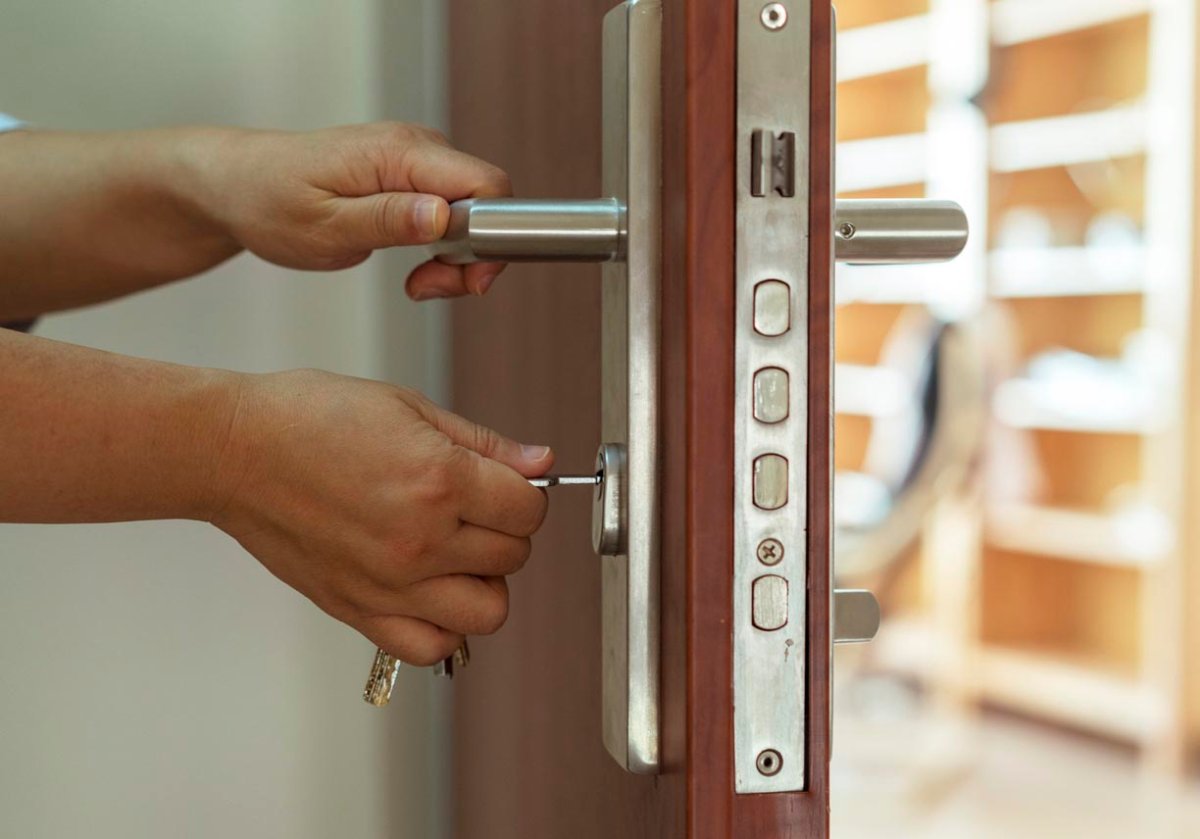

We may earn revenue from the products available on this page and participate in affiliate programs. Learn More ›
Q: I recently rented a new apartment. After I moved in, I learned there has been an uptick in break-ins in the neighborhood, and now I’m nervous because I don’t want to be a victim! What can I do to increase my apartment door security?
A: Being a renter can be tricky because it generally isn’t possible to make changes and improvements to the structure of the home, such as the front door. If an apartment has a door that is flimsy or missing a peephole, there’s not a lot the renter can do besides asking their landlord to install a better door. However, this doesn’t mean that renters shouldn’t put effort into improving their apartment security.
According to Tim Rader, senior director of product development at home security company ADT, “Apartment renters are actually more vulnerable to theft than homeowners, as a casual intruder is less likely to be noticed. Opportunistic neighbors can also pose a risk as they’re more likely to be familiar with your schedule and could know your unit’s weak spots.”
Fortunately, there are ways for renters to improve apartment door security, and some of the most useful steps will come at no or low cost aside from some time and effort. Renters can learn more about how to prevent home invasion while living in an apartment.
Protect your home and family with a top-notch security system. Vivint’s professionally installed systems don‘t just alert you to threats—they help both prevent and deter them. See Vivint’s cameras and services.
Ask the property owner if the lock has been rekeyed.
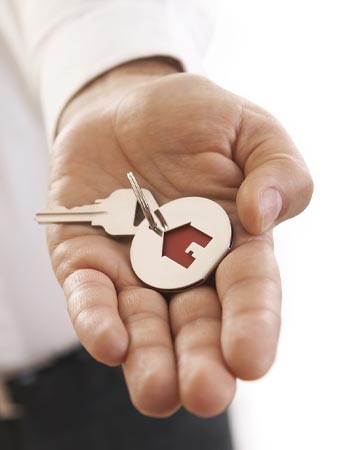
When a renter first moves into an apartment, they’ll receive the key to the front door. They may then decide to make a few copies of the key to hand out to friends or family members in case of emergency. But there’s a good chance that the previous occupant of the apartment did the same—so just how many keys are floating around to that door?
Since the lock is the first line of defense, the renter will want to be sure they’re the only person (other than the property owner) who has access. It’s a good idea for the renter to ask the property owner if the lock was rekeyed after the previous tenant vacated. If the answer is no, they’ll want to follow up by requesting that the landlord change the locks on the door as soon as possible.
Block any view into your apartment.
Renters will want to cover their windows in a way that prevents would-be home invaders from seeing what is inside. This is an especially important step for first-floor apartment safety. Bed sheets or attractive pieces of fabric can easily be tacked up to block the view without obscuring the light. Pull-down shades aren’t expensive and can be installed with a few basic tools, and home improvement stores even carry privacy film or stick-on fabric blinds that adhere to the window and can be removed with some warm water when the tenant is ready to move.
Alternatively, strategic furniture placement can also be effective: A freestanding bookcase positioned in front of an apartment window can block the view inside. Finally, the renter will want to consider what’s in view when they open the door and consider moving easy-to-grab valuables from sight. What potential criminals can’t see won’t tempt them.
Need a home security system? SimpliSafe can help. With a comprehensive whole-house solution, you can be prepared for the unexpected. View SimpliSafe systems and prices.
Install a deadbolt lock and strike plate if you don’t already have one.
Ideally, an apartment door will have a secure door lock on the knob or handle and a sturdy deadbolt. Some apartments also have chain locks or top deadbolts for extra security. If a renter finds that their apartment door only has a knob lock or the deadbolt is loose, they’ll want to replace or add one. The tenant will need to either request that this be done by the landlord or get permission to do it themselves. Either way, deadbolts are a necessary part of a secure home.
The best deadbolts need something more than a tired wooden door jamb to sink into, so when the renter discusses the deadbolt with their property owner, they’ll want to request that the new lock be made entirely of steel and that the installation include a strike box (a reinforced metal box that increases the strength of the door frame and makes the lock more difficult to kick in). If the tenant must do the installation themselves, they can look into one of the best door lock installation kits, which usually come with templates and clear instructions. Another option is for the renter to get help from one of the best handyman services such as Mr. Handyman.
If you have an inward-swinging door, consider installing a door jammer and a door brace.
For those looking for ways to secure a door from being kicked in, several simple-to-use tools can add an extra layer of security. The best door security bars, also called door jammers, are adjustable metal tubes with a nonslip rubber foot on the bottom and a rubberized cup- or V-shaped block at the top. To use one, a renter will adjust the length of the pole, wedge the cup-shaped block under the doorknob, and then firmly press or kick the foot toward the door until it is wedged in place. If someone tries to open the door while the bar is in place, the pressure on the door will tighten the position of the bar, making it impossible to open the door. These bars are also useful for securing a door without a lock if the tenant has roommates against whom they’d like to secure their bedroom door overnight. For lever-handle doors, some jammers fold in half, wedging underneath the door itself and pressing into the floor behind itself to create the same effect (these are also the best portable door locks for travel).
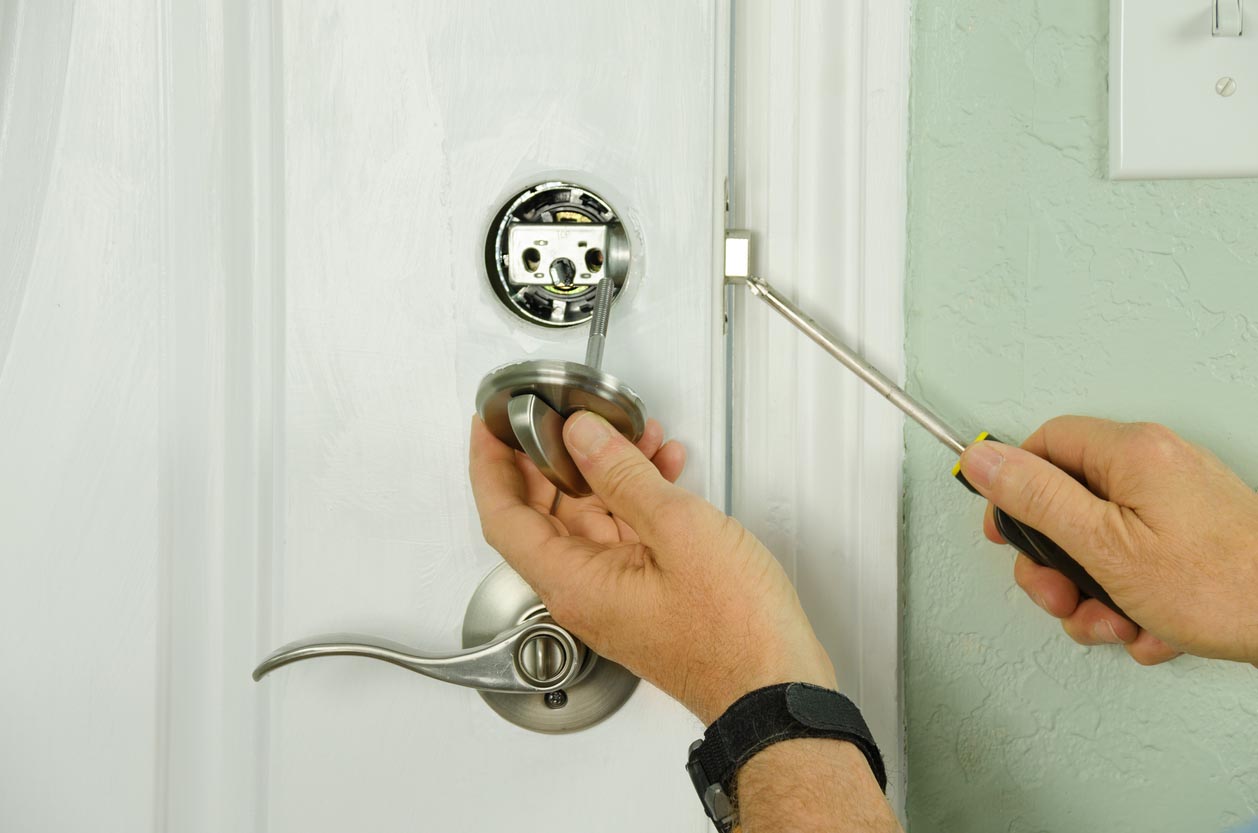
Frontpoint protects your home in an emergency, whether it’s a break-in, fire, medical emergency, and more. View Frontpoint products.
Other braces can be more permanently installed. Floor barricade bases can be screwed into the floor just inside the threshold to be out of the way when not in use, and then a plate can be slipped into the base to prevent the door from being opened. Strike plate locks can be screwed into the wall near the door, and both stand in the way of the door opening (similar to a chain) but also feature a loop that slips over the doorknob. These options are great for those who need to know how to secure a door that opens outward. However, they do require installation, so the renter will either need permission from their landlord or good patching skills for when they move out.
A door-stop alarm can alert the renter and their neighbors while scaring away an intruder.
Door-stop alarms are small, wedge-shaped devices that can be placed in front of a door that swings inward. If someone tries to push the door open from outside, it will put pressure on the wedge, triggering a loud alarm to sound and blocking the door from opening further. Door-stop alarms are a great option, as they provide the dual benefit of alerting residents to an attempted entry (and hopefully scaring off the intruder) and also securing the door. They are also portable, battery-powered, and relatively inexpensive compared to the cost of an apartment security system.
Secure sliding apartment doors as well as the main front door.
If the apartment has a balcony or patio, it may be accessible by a sliding door. Most locks and alarms are designed for traditional doors, but fortunately, there are also plenty of ways to secure a sliding glass door. For instance, there are products on the market that are designed to sit inside the sliding-door track to prevent them from being opened. In a pinch, a wooden plank or metal rod can also do the trick. For those concerned about an intruder entering by smashing the glass door, it may be wise for them to invest in some security film, which reinforces the glass and holds shards in place if it is broken.
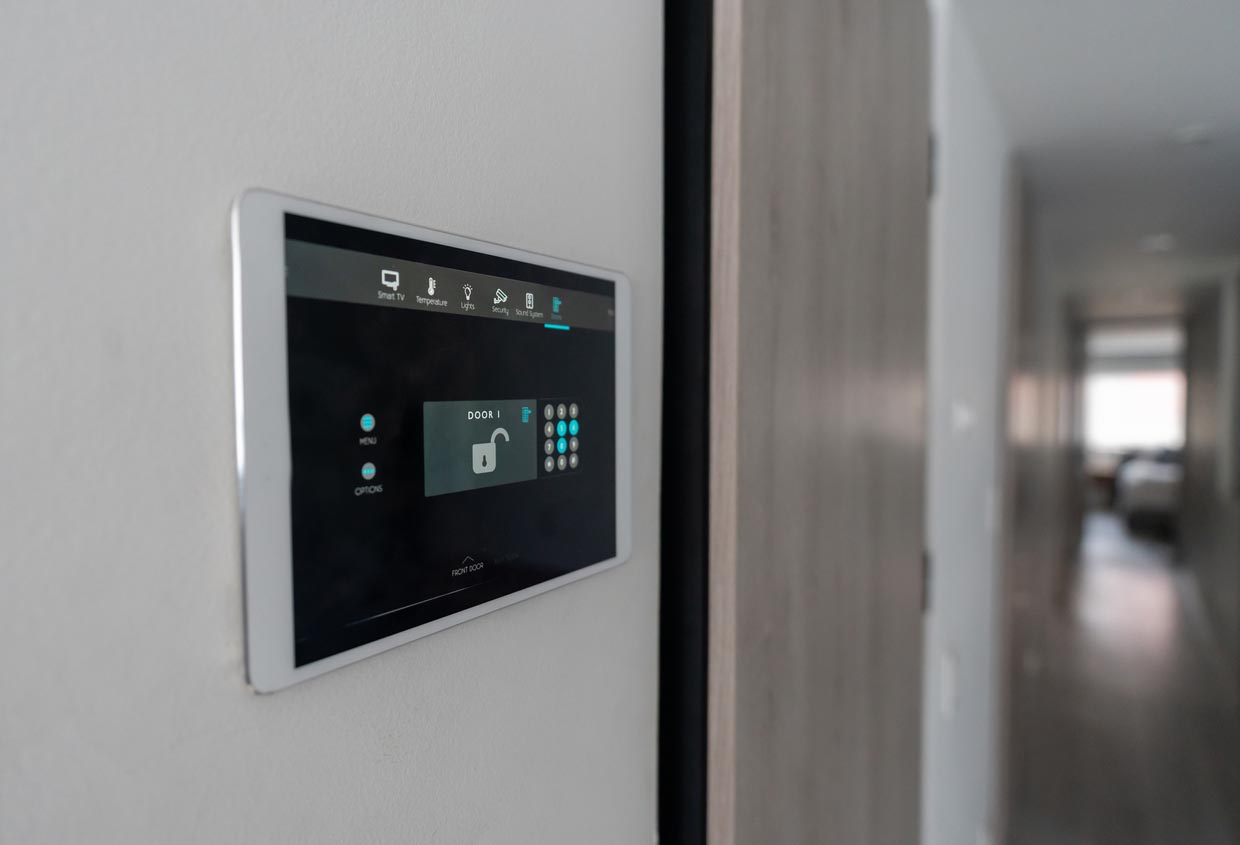
Invest in a rental-friendly security system.
The recent explosion of DIY security systems has greatly increased the availability of renter-friendly security options that can be installed without damaging walls. The best apartment security systems (such as one from SimpliSafe) can be as simple as a doorbell or peephole camera that shows the user who is outside, or as complex as a system of cameras and door and window sensors. “Renters should consider the size and number of rooms of their apartment when buying a home security system, as smaller and DIY home security packages allow for customization so renters don’t end up with extra equipment that doesn’t get used,” recommends Rader.
In many cases, apartment security cameras and other equipment included in DIY systems are simple enough to install that renters can do it themselves, saving them security camera installation costs. This also means that the system can be easily removed and taken with the renter when they move to a new apartment. Even Amazon’s Alexa offers security features: Alexa Guard can turn an Alexa-connected Echo into a listening device that senses sounds like breaking glass or footsteps, and Alexa Intruder Alert allows the user to program Alexa devices to flash the lights, shout at the intruder, or play loud music or an alarm sound.
Many of the best home security companies (such as Vivint or ADT) offer a professionally monitored option, meaning they will alert the customer and the authorities if something goes wrong. Typically the service can be transferred at minimal cost, or the contract terms are shorter so the customer doesn’t get stuck paying for a security system they can’t use if they have to move. Whatever system a renter desires, home security costs may be more affordable than they think and can bring them great peace of mind. Often just having a security sign can deter crime since a would-be intruder will likely skip an apartment that is protected by a security system.
Deep Sentinel Home Security systems can make you and your family feel safe and secure with top-of-the-line equipment and live guards watching your home. View Deep Sentinel Home Security systems and prices.
Talk to the property owner.
One of the best ways for a renter to improve their apartment safety is to work with the property owner. Presumably, the property owner also has an interest in improving security because the resulting damage from a break-in can be costly.
First, it’s generally best for a renter to communicate with the property owner in writing so that they’ll have a record of their requests and the landlord’s responses if there is an issue later. It’s also ideal for a renter to help the property owner solve the problem or provide some constructive suggestions rather than simply demanding a solution. If the renter is friendly and businesslike in their approach, they’re more likely to get a positive response.
Finally, renters will want to remember that they’re paying rent for the space in which they live and that they deserve to feel safe in it. If there are any other ways building security can be improved, they’ll want to communicate these to the property owner too. “I recommend checking your apartment building’s security by assessing if it has sufficient light in common areas, working locks or gates to keep strangers from entering, working security cameras, etc.,” says Rader. Ample door security is a fair request, as is requesting the landlord address other safety and security concerns around the building and surrounding property.
Get renters insurance.
Some property owners require that their renters carry a renters insurance policy so that they won’t be liable for their renters’ personal property in the event of a fire or other catastrophe, but often that requirement is the first time many renters are aware that renters insurance is even available.
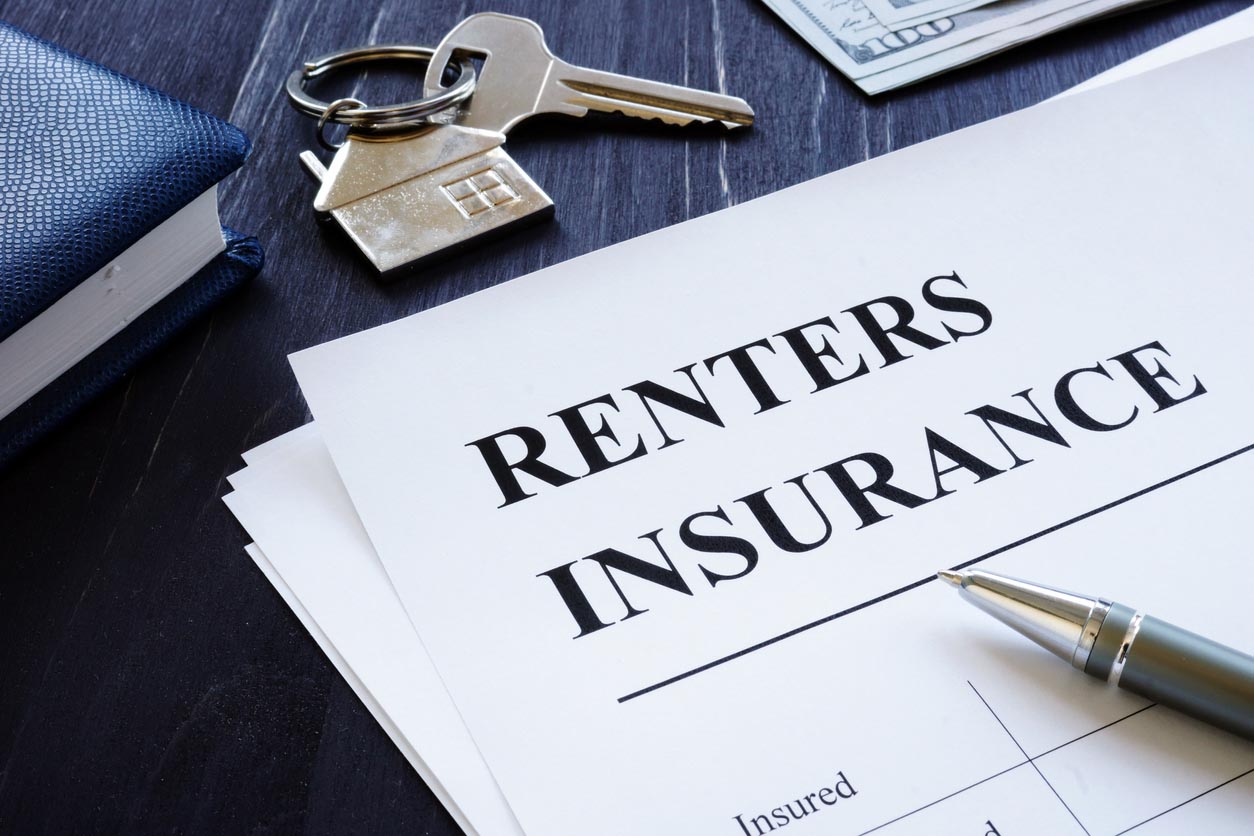
Renters insurance is based on the amount of property the policyholder wants to insure. The renter will pay an annual premium, select a deductible (how much of a claim they’ll have to pay out of pocket), and select a coverage limit. Renters insurance policies do not cover the building itself or the property on which it sits, so in the event of a break-in, the physical damage to the door or window and any walls or permanent fixtures will be covered by the property owner. The items in the apartment, however, are the renter’s responsibility, and the damage caused during a break-in or burglary can mount up much faster than expected.
The best renters insurance companies, like State Farm and American Family Insurance, have policies that are quite affordable and can provide coverage so that a break-in or fire doesn’t claim the renter’s financial security as well as their personal items. In many cases, having a professionally monitored security system can result in a discount on renters insurance.
Developing good apartment door security and making an apartment less appealing to burglars is important for renters; choosing a security system and protecting themselves financially against loss will complete their apartment security plan.
